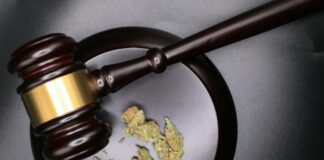
April Fools’ Day has arrived yet again, sending all rationale and trustworthiness into a tailspin for 24 hours. As of late, the annual prank holiday has prompted many companies and advertising teams to unveil marketing campaigns that have no basis in reality.
The cannabis industry is certainly not immune to the clownish nature of April Fools’ Day. At a time where society is being inundated with fake news and clickbait, you’d be wise to take anything that you read on April 1 with a hefty grain of salt.
For instance, you may come across a delectable story announcing that the world’s first cannabis-infused soft serve ice cream coming to Vancouver, British Columbia. The Canadian ice cream storefront, 720 Sweets, announced on April 1, 2019, that it would be releasing The Mint Elf. Detailed as a “perfected” soft serve recipe that was created in tandem with “several biochemists,” the purported flavor is said to contain “high-grade THC-infused milk” and is topped with chocolate drizzle and small pieces of chocolate.
Don’t be fooled: this soft serve has no THC.
After speaking with Wilson K. Lee, founder of 720 Sweets, Weedmaps News discovered that this cannabis-infused soft serve ice cream was nothing more than a marketing hoax. While the Mint Elf flavor will actually be released across his three storefronts, consumers will be disappointed to find absolutely zero THC in 720 Sweets’ faux cannabis-infused concoction.
“The whole thing is just a really big play on April Fools’ Day,” Lee told Weedmaps News. “That’s the reason why we’ve been reaching out to different publications to send this thing out, to garner a bunch of people talking about it. When it comes off as an elaborate April Fools’ prank people will be talking about it.”
Although recreational use of cannabis has been legalized in Canada, the country has yet to establish a legal framework for edibles. Despite that, we imagine that some cannabis enthusiasts might roll up to the ice cream shop and feel duped by the seemingly real THC-infused soft serve.
Why Has April Fools’ Day Become a Major Marketing Tool?
Deceiving as this marketing ploy it might be, 720 Sweets is not the only company to entice prospective customers with cannabis-related hoaxes and bogus announcements. THB Bagels & Deli, a bagel shop in Baltimore, Maryland, stated in 2018 that it would be serving cannabis-infused bagels prior to the annual prank event.
Even household names such as Netflix have utilized cannabis-loving celebrities in their own April Fools’ shenanigans. In 2018, the entertainment streaming service claimed to have acquired the rights to “world-renowned Canadian person” and “prolific marijuana-doer” Seth Rogen.
The recent fondness of using April Fools’ Day for marketing extends far beyond the cannabis industry, as even Google and Amazon have been getting involved in the holiday hijinks for quite some time.
Why exactly has April Fools’ Day become a stage for advertisers to promote false products and ideas? There are a few reasons.
For starters, this day provides advertisers with an opportunity to get deceptively creative and out-of-the-box with their marketing efforts. In the golden age of social media, a well-executed prank could potentially generate as much conversation as the release of a truly groundbreaking product.
“On April Fools’, our brand can earn media coverage and attract the attention of millions of people with a single video ad,” Ryan DiMillo, director of digital marketing for Life Storage, told Forbes in 2018. “We’ve found that people are interested in the April Fools’ brand pranks the same way they watch for the ads during the Super Bowl.”
To all marketers out there planning your Brands’ April Fools Day ad- please use the weekend to re-consider! #tiredstrategy
— BradJakeman (@BradJakeman) March 29, 2019
April Fools’ Day-related marketing campaigns also present companies with a chance to engage with new customers who otherwise wouldn’t connect with a certain product or brand. But marketing hoaxes can also backfire if a company is not careful with its false advertising, especially on social media. Misleading people in a marketing campaign could cause potential customers to avoid a company’s products altogether.
“Using social media for marketing campaigns means walking a fine line. It’s a medium to be handled with great care if you don’t want things to backfire,” Andreas Illmer wrote for BBC in 2016.
How to Spot Cannabis-Related April Fools’ Day Pranks in the Wild
At this point, you may be wondering how to sort fact from fiction while browsing the internet for cannabis-related news and products on April 1.
The first and most obvious factor to look out for is the date of publishing. If the story or product was released on or just prior to April Fools’ Day, you should definitely remain wary of the information you’re ingesting.
Secondly, if something sounds too good to be true, that’s because it probably is. While the marketing stunt conducted by 720 Sweets seems semi-believable, considering that recreational cannabis use is now legal in Canada, most April Fools’ Day advertisements should be discernible from reality if you inject a bit of critical thinking.
In the event that a feasible product or announcement is made on April Fools’ Day, the next course of action would be to take a deeper dive and do some research. Chances are, if you visit a company’s website or look for other sources addressing the potential prank, you should be able to find your way to the truth.
As the cannabis industry continues to evolve and ingrain itself into the mainstream, you should expect more weed-related hoax marketing campaigns to emerge. April Fools’ Day might be the perfect day to prank your friends and propose bizarre marketing ideas, but it’s important to remain diligent and avoid being tricked as you seek out your weed-related news on this fateful day of falsehoods.
— Tyler Koslow















